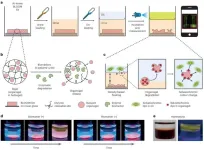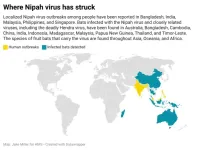(Press-News.org) A study recently published by researchers from the Sant Pau Research Institute (IR Sant Pau) and the Stroke Unit of Sant Pau Hospital in the Journal of Lipid Research provides new evidence on the essential role of the qualitative properties of lipoproteins, such as LDL and HDL, in the pathophysiology of cardiovascular diseases, including ischaemic stroke. The findings underscore the importance of going beyond traditional quantitative cholesterol levels to evaluate the risk of these pathologies.
Dr Sonia Benítez, a researcher in the Cardiovascular Biochemistry Research Group at IR Sant Pau and one of the study’s authors, emphasised that "it is not so much the amount of LDL or HDL as their quality that determines the residual risk of ischaemic stroke. This study confirms that some qualitative alterations in lipoproteins, such as the increased negative electric charge in LDL and HDL (LDL(-) or HDL(-)), could play a causal role in the progression of cardiovascular diseases."
The relationship between ischaemic stroke and lipoproteins
Ischaemic stroke, one of the leading causes of mortality and disability worldwide, is often linked to carotid atherosclerosis. Approximately 20% of strokes are directly associated with the presence of atheromatous plaques in the carotid arteries, significantly increasing the risk of severe vascular events. Traditionally, the clinical management of these patients has focused on reducing LDL and HDL cholesterol levels. However, this new study from IR Sant Pau highlights that the qualitative characteristics of lipoproteins are also crucial in the development and progression of these diseases. This new perspective creates opportunities to innovatively address lipoprotein alterations and associated risks.
The study was conducted as an observational cohort study at Sant Pau Hospital between January 2016 and March 2019. The population studied included adult patients who had experienced anterior circulation ischaemic stroke and recently diagnosed carotid atherosclerosis, as well as a control group of healthy subjects. Lipoproteins were isolated from blood samples of 27 healthy subjects and 64 patients with carotid atherosclerosis seven days and one year after the stroke.
Alterations in qualitative properties
Seven days after the first stroke, LDL showed an increase in negative charge, an elevation of pro-inflammatory ceramides and triacylglycerols, and a decrease in phospholipids and cholesterol. A comprehensive lipidomic study of LDL was conducted in collaboration with Dr Öörni’s group at the Wihuri Research Institute in Helsinki. These LDL modifications are associated with inflammatory and atherogenic processes that increase the vulnerability of carotid plaques. Regarding HDL, protein composition alterations were identified, such as a reduction in apoA-I levels and an increase in apoA-II and apoC-III, impairing their antioxidant and anti-inflammatory properties and compromising their ability to prevent LDL modification and its inflammatory effect.
A notable aspect is that these qualitative alterations persist despite the early introduction of medications like statins. “This suggests that these modifications are deeply rooted in the patient’s pathophysiology. However, one year after the stroke, thanks to therapeutic interventions such as statins and antiplatelet agents, as well as possible lifestyle improvements, lipoproteins showed significant improvement,” adds Dr Sonia Benítez.
Thus, LDL became less prone to oxidation and aggregation, while HDL partially recovered its protective properties. Additionally, a reduction in LDL(-) and HDL(-) levels—electronegative lipoprotein subtypes with high atherogenic potential—was observed. “This may mean that therapeutic interventions can partially reverse the harmful effects of these alterations,” adds Dr Núria Puig, also a researcher in the Cardiovascular Biochemistry Group and the first author of the publication.
A paradigm shift
This research introduces a paradigm shift in understanding the functional role of lipoproteins in cardiovascular diseases, particularly in ischaemic stroke associated with carotid atherosclerosis. The findings underscore the need for an integrative approach to explore the qualitative properties of lipoproteins to identify patients at high risk of complications, even when their quantitative lipid levels appear normal.
This can help personalise treatments based on the specific characteristics of each patient and better tailor pharmacological and non-pharmacological interventions. The researchers also point towards developing therapeutic strategies aimed at modifying lipoprotein composition, with a potential positive impact on preventing cardiovascular complications. This includes reducing LDL(-) and HDL(-) through dietary changes, physical exercise, and more consistent adherence to statin treatments.
Clinical implications and future directions
However, the study has some limitations, such as the small sample size, which makes it difficult to generalise the results. This highlights the need for studies with larger cohorts to confirm the findings and analyse specific subgroups, such as by sex or type of therapeutic intervention. In this regard, Dr Pol Camps from the Stroke Unit, second author of the publication, and Dr Benítez have recently formed, along with other European groups, a consortium called BioStroke focused on stroke biomarker research, aiming to establish collaborations that will allow for expanding studies to larger patient cohorts.
According to Dr Benítez, “translational research in this field is key to bringing these findings into clinical practice. Our future goal is to develop tools to identify patients at higher risk and eventually design therapeutic strategies aimed at reversing these lipoprotein alterations.” This research opens a promising avenue for future clinical approaches that focus not only on traditional lipid levels but also on the qualitative properties of lipoproteins, thereby complementing current therapeutic strategies and reducing the risk of stroke recurrence and other cardiovascular complications.
END
Bladder cancer has a cure rate of over 90% when detected early, but it has a high recurrence rate of 70%, necessitating continuous monitoring. Late detection often requires major surgeries such as bladder removal followed by artificial bladder implantation or the use of a urine pouch, significantly lowering the patient’s quality of life. However, existing urine test kits have low sensitivity, and cystoscopy, which involves inserting a catheter into the urethra for internal bladder examination, is both painful and burdensome. This highlights the urgent need for a simple yet accurate diagnostic technology for patients.
The research team led by Dr. Youngdo Jeong of the Center for Advanced ...
Researchers at the Autism Research Centre at Cambridge University found that these individuals also report experiencing lower quality healthcare than both autistic and non-autistic people whose gender identity matches their sex assigned at birth (cisgender).
The findings have important implications for the healthcare and support of autistic transgender/gender diverse (TGD) individuals. This is the first large-scale study on the experiences of autistic TGD people and the results are published today in Molecular Autism.
Previous research suggests that both autistic people and TGD people separately have poorer healthcare experiences ...
Embargoed for release until 5:00 p.m. ET on Monday 20 January 2025
@Annalsofim
Below please find summaries of new articles that will be published in the next issue of Annals of Internal Medicine. The summaries are not intended to substitute for the full articles as a source of information. This information is under strict embargo and by taking it into possession, media representatives are committing to the terms of the embargo not only on their own behalf, but also on behalf of the organization they represent. ...
Dr. Park Jun-woo's team at KERI's Next Generation Battery Research Center has overcome a major obstacle to the commercialization of next-generation lithium–sulfur batteries and successfully developed large-area, high-capacity prototypes.
The lithium–sulfur battery, composed of sulfur as the cathode (+) and lithium metal as the anode (-), has a theoretical energy density more than eight times that of lithium-ion batteries, demonstrating significant potential. Additionally, it uses abundant sulfur (S) instead of expensive rare earth elements, making it cost-effective and environmentally ...
A new study reported in the Cell Press journal Current Biology on January 20 is the first to describe a phenomenon researchers refer to as “contagious urinations.” The study in 20 captive chimpanzees living at the Kumamoto Sanctuary in Japan shows that, when one chimp pees, others are more likely to follow.
“In humans, urinating together can be seen as a social phenomenon,” says Ena Onishi of Kyoto University.
“An Italian proverb states, ‘Whoever doesn’t pee in company is either a thief or a spy’ (Chi non piscia in compagnia o è ...
Scientists at Harvard Medical School and Boston University Chobanian & Avedisian School of Medicine have mapped a critical component of the Nipah virus, a highly lethal bat-borne pathogen that has caused outbreaks in humans almost every year since it was identified in 1999.
The advance, described Jan. 20 in Cell, brings scientists a step closer to developing much-needed medicines. Currently, there are no vaccines to prevent or mitigate infection with the Nipah virus and no effective treatments for the disease ...
Demand for weight-loss medications sold under brand names such as Ozempic and Wegovy continues to surge, with a recent study reporting one in eight Americans has taken or is currently using the drugs to treat diabetes, heart disease or obesity.
Formally, these drugs are known as glucagon-like peptide-1 receptor agonists (GLP-1RA) and include Mounjaro and Zepbound. Informally, media, patients and even some physicians have dubbed GLP-1 medications as “miracle drugs” because of the profound weight loss among users. While these health benefits are well established, information is sparse on the drugs’ effects across ...
Over half of our genomes consists of thousands of remnants of ancient viral DNA, known as transposable elements, which are widespread across the tree of life. Once dismissed as the "dark side" of the genome, researchers at Helmholtz Munich and Ludwig-Maximilians-Universität (LMU) have now revealed their crucial role in early embryo development.
Unanswered Questions About the Role of Ancient Viral DNA
Transposable elements, remnants of ancient viral DNA, are reactivated during the first hours and days following fertilization. ...
Researchers at Karolinska Institutet and the Astrid Lindgren Children’s Hospital in Sweden have determined how children’s immune systems react to different kinds of cancer depending on their age. The study, which is published in the journal Cell, reveals significant differences between the immune response of children and adults, and has the potential to lead to new tailored treatments for children with cancer.
“The activation of the immune system is crucial to our ability to fight cancer, but differs between children and adults,” says Petter Brodin, professor of paediatric immunology at the ...
Background and objectives
Waist circumference (WC) is closely associated with metabolic diseases, including diabetes mellitus (DM), metabolic syndrome, and mortality. However, the correlation between WC and mortality varies across populations and has rarely been examined specifically in patients with DM. In this study, we explored the relationships between WC and both all-cause and cardiovascular mortalities among individuals with DM.
Methods
Participants from the National Health and Nutrition Examination Survey 2003–2018 included 3,151 women and 3,473 men with DM who had baseline WC measurements. Survival data were collected from enrollment until December 31, 2019. ...







